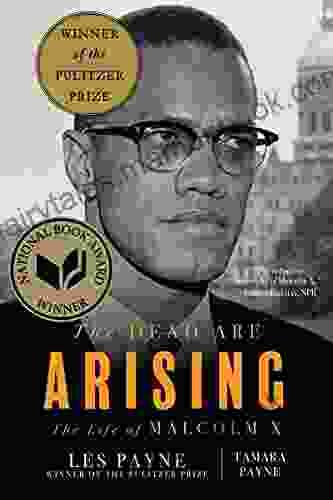The Life of Malcolm X: From Militant to Civil Rights Leader

Early Life and Education
Malcolm X, born Malcolm Little on May 19, 1925, in Omaha, Nebraska, had a tumultuous childhood marked by poverty, racism, and family tragedy. His father, Earl Little, an outspoken Baptist minister who advocated for the rights of African Americans, was murdered by the Ku Klux Klan when Malcolm was six years old. His mother, Louise Little, struggled to raise her children as a single parent and eventually suffered a nervous breakdown, leading to Malcolm and his siblings being placed in foster care.
4.8 out of 5
| Language | : | English |
| File size | : | 2474 KB |
| Text-to-Speech | : | Enabled |
| Screen Reader | : | Supported |
| Enhanced typesetting | : | Enabled |
| X-Ray | : | Enabled |
| Word Wise | : | Enabled |
| Print length | : | 601 pages |
Malcolm's experiences in foster care and facing racial discrimination at a predominantly white school shaped his worldview. He dropped out of high school at the age of 15 and moved to Boston to live with his half-sister. In Boston, he fell into a life of crime and eventually ended up in prison.
Conversion to the Nation of Islam
While in prison, Malcolm encountered Elijah Muhammad, the leader of the Nation of Islam (NOI),a black nationalist and separatist group. Muhammad's teachings of black self-reliance, racial pride, and separation from white society resonated with Malcolm, who saw it as a way to combat the racism and injustice he had experienced. He adopted the name Malcolm X, dropping his "slave name" Little, and became a fervent follower of the NOI.
Malcolm X quickly rose through the ranks of the NOI, becoming one of its most prominent ministers and spokespersons. He established mosques in cities across the United States and energized the organization with his fiery speeches that condemned white supremacy and advocated for the rights of African Americans.
Black Power and Pan-Africanism
As Malcolm X gained prominence within the NOI, he became increasingly involved in the Black Power Movement, which advocated for self-determination and armed resistance against white oppression. He coined the phrase "by any means necessary," which became a rallying cry for those who believed in using violence to achieve their goals.
Malcolm X also became a prominent voice in the Pan-African movement, advocating for unity and solidarity among African people worldwide. He traveled to Africa and met with leaders such as Kwame Nkrumah of Ghana and Julius Nyerere of Tanzania, who shared his vision of a liberated Africa.
Break with the Nation of Islam
In the early 1960s, Malcolm X began to question some of the teachings and practices of the NOI. He had come to believe that the group's emphasis on separation from white society was counterproductive and that it hindered the possibility of racial reconciliation. Additionally, he was disillusioned by Muhammad's alleged extramarital affairs and his autocratic leadership style.
In 1964, Malcolm X left the NOI and founded his own organization, the Muslim Mosque, Inc. He also embarked on a pilgrimage to Mecca, which profoundly changed his worldview. After witnessing the diversity and unity of Muslims from all races and backgrounds, he renounced his previous separatist views and adopted a more inclusive approach to racial equality.
Civil Rights Leadership and Assassination
Post-Mecca, Malcolm X became a more moderate and pragmatic civil rights leader, embracing nonviolent resistance and interracial cooperation. He formed alliances with other organizations, including the Student Nonviolent Coordinating Committee (SNCC) and the Southern Christian Leadership Conference (SCLC). He also moderated his rhetoric and focused on building bridges between different racial and religious groups.
Malcolm X's transformation from a militant separatist to a civil rights leader did not sit well with some of his former NOI associates. On February 21, 1965, he was assassinated by three gunmen while delivering a speech at the Audubon Ballroom in Manhattan. His assassination sent shockwaves throughout the nation and remains a controversial and unresolved event.
Legacy and Impact
Malcolm X's legacy as a civil rights icon is complex and multifaceted. He was a polarizing figure during his lifetime, criticized for his militant views and controversial statements. However, his evolution into a proponent of racial equality and nonviolence has ensured his enduring influence.
Malcolm X's ideas and speeches continue to inspire activists and leaders working towards social justice and racial reconciliation. His contributions to the Civil Rights Movement and his unwavering commitment to the fight against racism have solidified his place as a symbol of resistance and a reminder of the ongoing struggle for equality.
The life of Malcolm X is a testament to the power of transformation and the possibilities for growth and change. From his humble beginnings as a foster child to his rise as a fiery separatist and his eventual evolution into a civil rights leader, Malcolm X's journey reflects the complexities of race, identity, and the human experience. His legacy serves as a reminder of the importance of confronting injustice, promoting equality, and striving for a better world for all.
4.8 out of 5
| Language | : | English |
| File size | : | 2474 KB |
| Text-to-Speech | : | Enabled |
| Screen Reader | : | Supported |
| Enhanced typesetting | : | Enabled |
| X-Ray | : | Enabled |
| Word Wise | : | Enabled |
| Print length | : | 601 pages |
Do you want to contribute by writing guest posts on this blog?
Please contact us and send us a resume of previous articles that you have written.
 Top Book
Top Book Novel
Novel Fiction
Fiction Nonfiction
Nonfiction Literature
Literature Paperback
Paperback Hardcover
Hardcover E-book
E-book Audiobook
Audiobook Bestseller
Bestseller Classic
Classic Mystery
Mystery Thriller
Thriller Romance
Romance Fantasy
Fantasy Science Fiction
Science Fiction Biography
Biography Memoir
Memoir Autobiography
Autobiography Poetry
Poetry Drama
Drama Historical Fiction
Historical Fiction Self-help
Self-help Young Adult
Young Adult Childrens Books
Childrens Books Graphic Novel
Graphic Novel Anthology
Anthology Series
Series Encyclopedia
Encyclopedia Reference
Reference Guidebook
Guidebook Textbook
Textbook Workbook
Workbook Journal
Journal Diary
Diary Manuscript
Manuscript Folio
Folio Pulp Fiction
Pulp Fiction Short Stories
Short Stories Fairy Tales
Fairy Tales Fables
Fables Mythology
Mythology Philosophy
Philosophy Religion
Religion Spirituality
Spirituality Essays
Essays Critique
Critique Commentary
Commentary Glossary
Glossary Bibliography
Bibliography Index
Index Table of Contents
Table of Contents Preface
Preface Introduction
Introduction Foreword
Foreword Afterword
Afterword Appendices
Appendices Annotations
Annotations Footnotes
Footnotes Epilogue
Epilogue Prologue
Prologue Wownation Originals
Wownation Originals Barbara Crooker
Barbara Crooker J David Peach
J David Peach Vijay Hare
Vijay Hare Dan Fargo
Dan Fargo Kit Wright
Kit Wright Sonia Serravalli
Sonia Serravalli Kathryn Harkup
Kathryn Harkup Danielle Corbin
Danielle Corbin Alex Frost
Alex Frost Deborah Smith Parker
Deborah Smith Parker Alan Kenworthy
Alan Kenworthy Alan Brindley
Alan Brindley Marie Kristin Hofmann
Marie Kristin Hofmann Michael Alexander
Michael Alexander Emily Henderson
Emily Henderson Samantha Christy
Samantha Christy Michael Darr
Michael Darr Quinn Loftis
Quinn Loftis James Owen Weatherall
James Owen Weatherall
Light bulbAdvertise smarter! Our strategic ad space ensures maximum exposure. Reserve your spot today!
 Felix HayesFollow ·10.6k
Felix HayesFollow ·10.6k Marcel ProustFollow ·4.7k
Marcel ProustFollow ·4.7k Aldous HuxleyFollow ·18.4k
Aldous HuxleyFollow ·18.4k Duncan CoxFollow ·11.3k
Duncan CoxFollow ·11.3k Rudyard KiplingFollow ·4.6k
Rudyard KiplingFollow ·4.6k Seth HayesFollow ·15k
Seth HayesFollow ·15k Keith CoxFollow ·15.5k
Keith CoxFollow ·15.5k Aaron BrooksFollow ·10.6k
Aaron BrooksFollow ·10.6k

 Edwin Cox
Edwin CoxThe Great Deliverance Inspector Lynley: A Literary...
: In the realm of detective fiction,...

 Christian Carter
Christian CarterMetal Gear Solid Ground Zeroes Guide, Walkthrough, Tips,...
Metal Gear Solid...

 Branden Simmons
Branden SimmonsYellow Green: Not an Autobiography of Marcy Chen
Yellow Green:...

 Edward Reed
Edward ReedPurple Orchids: An Artistic Tale of Two Sisters in the...
Prologue: A Legacy Unveiled In the...

 Earl Williams
Earl WilliamsThe Evolving Housing Market Dynamics in Africa:...
The African housing market is a...

 William Faulkner
William FaulknerVoices In My Head: A Cerebral Symphony of Terror
In the labyrinthine...
4.8 out of 5
| Language | : | English |
| File size | : | 2474 KB |
| Text-to-Speech | : | Enabled |
| Screen Reader | : | Supported |
| Enhanced typesetting | : | Enabled |
| X-Ray | : | Enabled |
| Word Wise | : | Enabled |
| Print length | : | 601 pages |












